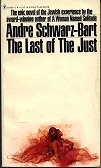
In 1959 The Last of the Just won the Prix Goncourt, the top literary award of France (the French Booker). A sweeping epic of a thousand years of Jewish life in Europe, the novel traces the fortunes and tragedies of one family with a special heritage. A member of each generation of the family is one of the 36 just men that Jewish tradition claims feel the suffering and pain of all the living, and without whom the world could not go on. Since the Jewish word for 36 is lamed vov, these men are often called Lamed Vovniks.
This strange and singular honor was attributed to the Levy family in 1085 following an attempt by the Bishop William of Nordhouse to massacre the Jewish citizens of York. To save his people, the Rabbi Yom Tov Levy leads them to an abandoned tower where they withhold a siege of six days by the local Christians. Rather than succumb to the indiginities of their captors, the Jews decide to take their own lives. As was done in Masada a thousand years earlier, the Rabbi takes on the role of blessing and killing each of the members of his community and then taking his own life. Some of the children, including the rabbi's son Solomon, survive. When Solomon becomes a man he has a vision from God where he is told that, because of his father's noble act, beginning with him, each generation of his family will contain one of the Lamed-Vovniks.
The first 140 pages of this book presents a history of the Levy family, their lineage of Lamed-Vovniks, and their fame in the Jewish community. The last three hundred pages tells the story of Ernie Levy, who is born in the Twentieth Century, during the events leading up to and in the Holocaust.
Sweeping in scope and yet focused on the life of a single man, this book presents the joys of Jewish community life and the accomodations they make to survive being a European minority marked for extermination by the Christian majority. It presents European history from a Jewish perspective and provides a detailed background to the insanity that is the Holocaust.
The point of view is that of a family of holy men whose compassion and wisdom gives the story great depth and understanding. Sadly, the Levy Lamed-Vovniks are all male. While the women of the story are well portrayed and strong personalities, they are never the main characters so the book has a decidedly male perspective. Sometimes funny, often sad, this is a great single volume introduction to Jewish history and culture, and a novel that is a classic in Jewish literature. I recommend it highly to anyone interested in the subject.
No comments:
Post a Comment